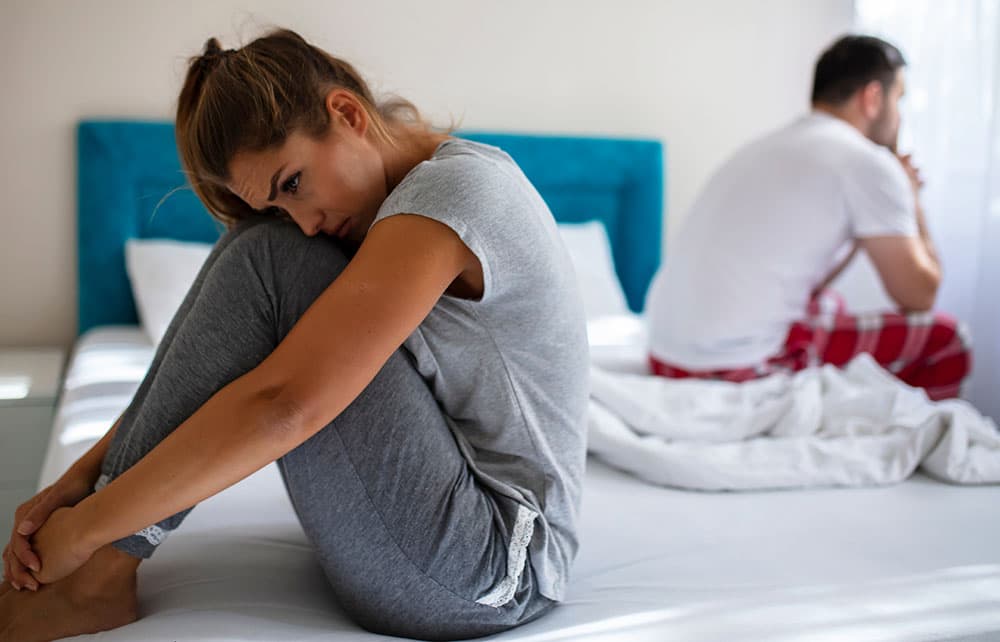Libido, or “sex drive,” is important to most people. It’s the interest or lack of interest someone feels in having sex with a partner or in self-stimulation. Libido ranges from the unusually high to the extremely low, and it’s as unique among individuals as personalities are.
Libido also varies throughout a person’s lifetime. It is affected by age, medical and mental health conditions, certain medications, stress, trauma, lifestyle, and relationship dynamics. Libido is also driven by hormones.
Testosterone, estrogen, and progesterone are the sex hormones critical to the development of sexual characteristics and reproduction. Males and females share all three. However, where they’re produced and how they interact with other organs and bodily systems are different.
Hormones are chemical messengers that regulate virtually every function of the body. The balance of the sex hormones at any point in time will influence your sex drive, but so will other hormones. Here are three ways they can.
1. They Can Make Sex More Enjoyable
People typically like to do what they enjoy. If sex is pleasurable, it’s easier to feel aroused more often than not. But for women, hormones can make a huge difference in their sexual comfort level.
Estrogen increases vaginal lubrication. Not only does this make sex more comfortable for women, but it also helps them reach orgasm. As women age, their estrogen production decreases. Vaginal dryness is a common symptom of menopause, which is why many women use lubricants to make sex more pleasurable.
Although estrogen production may be great for intercourse, it has a negative impact on other conditions. Endometriosis and the accompanying pelvic pain, for example, are treated by decreasing estrogen production. And pregnancy is prevented by hormonal birth control, which lowers natural estrogen production by introducing synthetic hormones.
Claims that hormonal birth control lowers libido are common, although the science is still out on that. However, women concerned about the amount of estrogen in their birth control can choose one with less estrogen. Junel fe birth control, for example, is a low-dose estrogen combination pill. It offers the advantages of other estrogen-progestin combination pills without as much synthetic estrogen.
Women who notice a change in libido while using hormonal birth control should have a frank discussion with their healthcare provider. There are many other possible physical or psychological reasons why their sex drive has downshifted. And for some women, using birth control will shift their desire into high gear. That may be because they’re less concerned about getting pregnant and more focused on enjoying sex.
2. They Affect Your Mood
Hormones are inexorably linked to many mental health issues, including depression, postpartum depression, mood swings, and anxiety disorders. These conditions can also result in low self-esteem, stress, physical fatigue, and other issues that lower sexual desire.
Estrogen impacts dopamine and serotonin production. Irregular estrogen production can lead to depression. Progesterone imbalances can lead to anxiety, mood swings, and depressed mood. Low testosterone can result in low libido and depression.
Anxiety often causes the overproduction of the hormone cortisol, which is also referred to as the “stress hormone.” Cortisol is responsible for a long list of issues that could affect libido, such as fatigue, irritability, erectile dysfunction, and irregular menstrual periods. It’s easy to see why too much cortisol would reduce sex drive.
There are prescription medications that can inhibit the overproduction of hormones such as cortisol. But in most cases, changes in sleep, diet, and exercise can reduce the stress that triggers it.
Mood plays a larger role in sex drive for some people than for others. For some, sex and gratification are purely physical. For others, connection and intimacy are necessary for arousal and satisfaction. Those suffering from mental health issues caused by hormonal imbalances may lose interest in either the physical or emotional benefits of sex. Maintaining balance may be the secret to being “in the mood.”
3. They Dictate the Laws of Attraction
People are far more likely to be sexually aroused by someone they’re physically attracted to. It may be a spark the instant they meet or a slow burn as they get to know someone over time. Whether it’s lust or love, hormones come into play.
Lust is all about sexual gratification, and it’s no surprise that testosterone and estrogen play a role. Testosterone fuels sex drives in both men and women, although admittedly more in men. But many women experience increased sex drives at ovulation when estrogen production is high.
Attraction to someone is also hormonal, driven by dopamine and norepinephrine. The brain releases the pleasure hormone dopamine when people are doing something that feels good to them. Norepinephrine makes people feel euphoric, excited, and giddy.
Vasopressin is a hormone that affects the regulation of blood pressure. That’s why elevated levels lead to erectile arousal in men. Then, there’s oxytocin, also called the “cuddle hormone.” It’s released in significant quantities during sex, childbirth, and breastfeeding, which are all bonding experiences.
There is a fine line between lust and love, and neither guarantees a healthy sex drive. But for those whose levels of dopamine, norepinephrine, and vasopressin are on the rise, they might rise to the challenge as well.
Get In the Driver’s Seat
Many people are content with low libido. They may not be interested in sex for an abundance of reasons. But those who are concerned about their lack of sex drive should talk to their healthcare providers. Hormones may or may not be the culprit. But if they are, there may be ways to get back into the driver’s seat and enjoy the ride.
